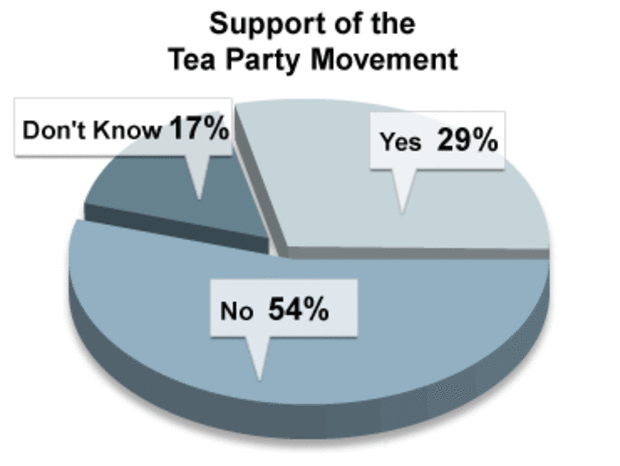Poll: Nearly 3 in 10 Support Tea Party
CBS News Poll analysis by the CBS News Polling Unit: Sarah Dutton, Jennifer De Pinto, Fred Backus and Anthony Salvanto.
Ahead of a rally in Washington this weekend that some say will test the strength of the Tea Party, a new CBS News poll finds that 29 percent of Americans say they are supporters of the movement.
Fifty-four percent say they do not support the Tea Party. The survey results are similar to last month's but show more support for the Tea Party than in April of this year.
Fifty-six percent of Tea Party supporters say they are conservative. Forty-four percent are Republicans, while 43 percent are independents. Few - just 13 percent - identify themselves as Democrats.
Conservatives and those who identify themselves as supporters of the Tea Party movement hold net positive opinions of former Alaska Gov. Sarah Palin, who has championed the movement. Forty-five percent of Republicans, 41 percent of conservatives and 49 percent of Tea Partiers hold favorable opinions of Palin.
However, Palin continues to receive unfavorable ratings from the American public overall. Just 23 percent of Americans have a favorable opinion of Palin, while 40 percent view her unfavorably.
Search the CBS News Poll Database
Democrats (62 percent), moderates (44 percent) and liberals (61 percent) hold decidedly negative views of the former vice presidential nominee.
More than a third of the public (35 percent) is undecided or hasn't heard enough about Palin to offer an opinion. Fewer Americans now hold a favorable view of Palin than in April, but her ratings are similar to what they were in March and last summer, shortly after she stepped down as governor.
More from the poll: Poll: Obama Approval Rating Up Slightly
Poll: Most Think Some Bush Tax Cuts Should Expire
Poll: Americans Split over Birthright Citizenship
Poll: Most Say New Orleans Deserves More U.S. Aid
Poll: Most Americans Say Iraq War Was a Mistake
Read the Complete Poll
This poll was conducted among a random sample of 1,082 adults nationwide, interviewed by telephone August 20-24, 2010. Phone numbers were dialed from random digit dial samples of both standard land-line and cell phones. The error due to sampling for results based on the entire sample could be plus or minus three percentage points. The error for subgroups is higher.
This poll release conforms to the Standards of Disclosure of the National Council on Public Polls.
